A Psychological Support to John
VerifiedAdded on 2022/11/14
|8
|2540
|138
AI Summary
This document describes the psychological support provided to John, a 58-year-old man admitted to a surgical ward for hip replacement surgery. The document explains the motivational interviewing techniques used to assist him in changing his health structure. The transtheoretical model of change is also used to describe the process of psychological support provided to John. The document also provides references to support the information provided.
Contribute Materials
Your contribution can guide someone’s learning journey. Share your
documents today.
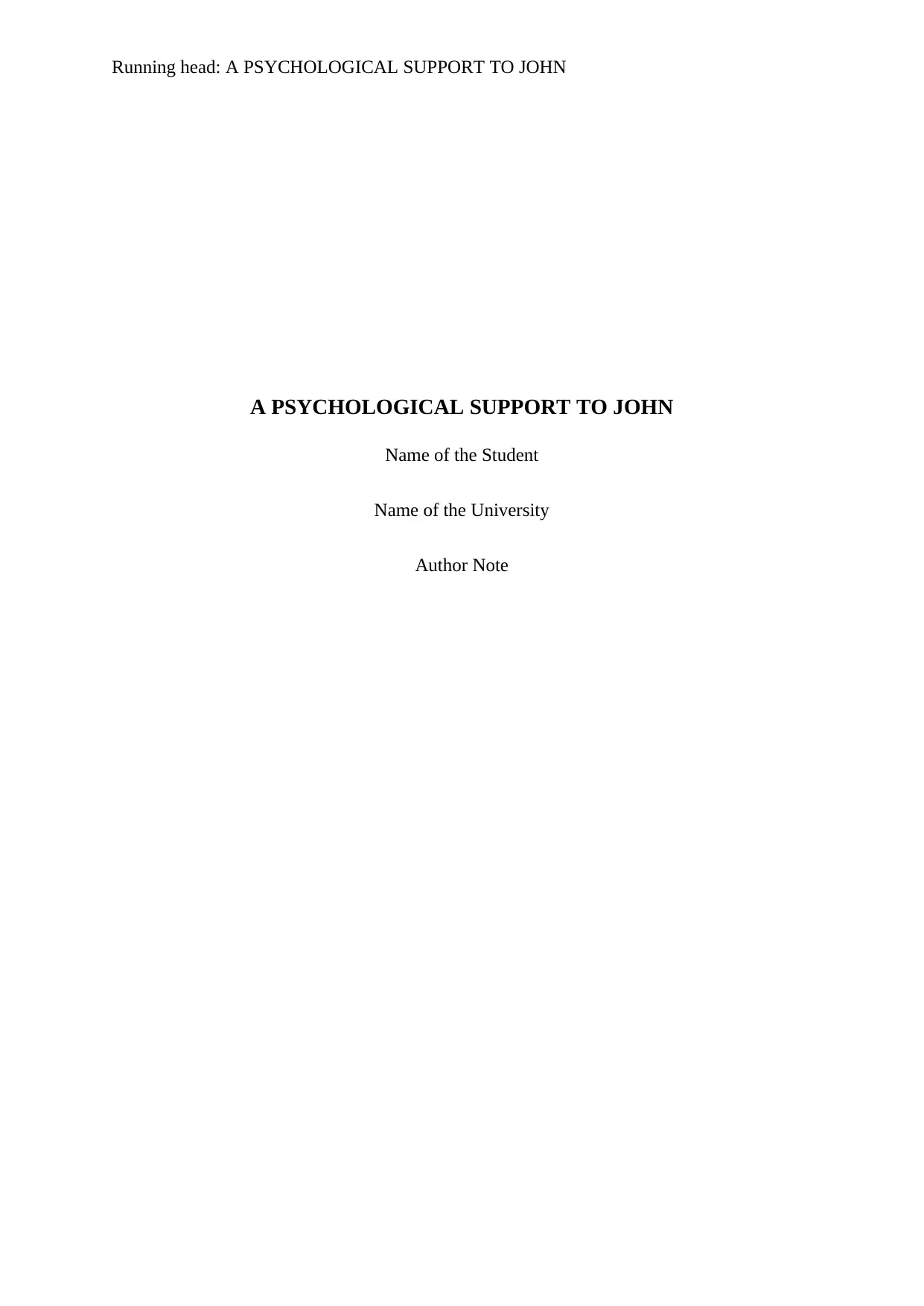
Running head: A PSYCHOLOGICAL SUPPORT TO JOHN
A PSYCHOLOGICAL SUPPORT TO JOHN
Name of the Student
Name of the University
Author Note
A PSYCHOLOGICAL SUPPORT TO JOHN
Name of the Student
Name of the University
Author Note
Secure Best Marks with AI Grader
Need help grading? Try our AI Grader for instant feedback on your assignments.
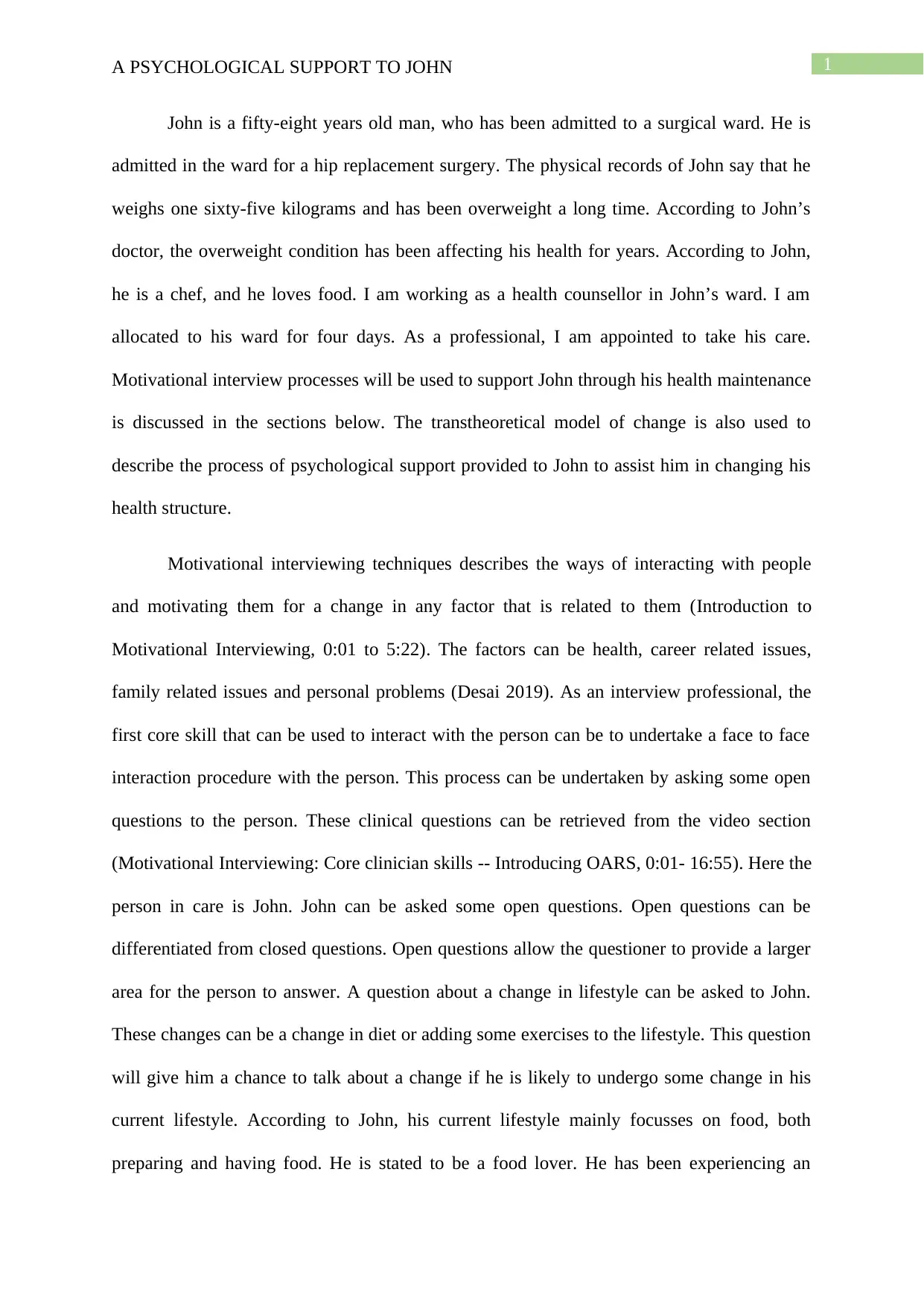
1A PSYCHOLOGICAL SUPPORT TO JOHN
John is a fifty-eight years old man, who has been admitted to a surgical ward. He is
admitted in the ward for a hip replacement surgery. The physical records of John say that he
weighs one sixty-five kilograms and has been overweight a long time. According to John’s
doctor, the overweight condition has been affecting his health for years. According to John,
he is a chef, and he loves food. I am working as a health counsellor in John’s ward. I am
allocated to his ward for four days. As a professional, I am appointed to take his care.
Motivational interview processes will be used to support John through his health maintenance
is discussed in the sections below. The transtheoretical model of change is also used to
describe the process of psychological support provided to John to assist him in changing his
health structure.
Motivational interviewing techniques describes the ways of interacting with people
and motivating them for a change in any factor that is related to them (Introduction to
Motivational Interviewing, 0:01 to 5:22). The factors can be health, career related issues,
family related issues and personal problems (Desai 2019). As an interview professional, the
first core skill that can be used to interact with the person can be to undertake a face to face
interaction procedure with the person. This process can be undertaken by asking some open
questions to the person. These clinical questions can be retrieved from the video section
(Motivational Interviewing: Core clinician skills -- Introducing OARS, 0:01- 16:55). Here the
person in care is John. John can be asked some open questions. Open questions can be
differentiated from closed questions. Open questions allow the questioner to provide a larger
area for the person to answer. A question about a change in lifestyle can be asked to John.
These changes can be a change in diet or adding some exercises to the lifestyle. This question
will give him a chance to talk about a change if he is likely to undergo some change in his
current lifestyle. According to John, his current lifestyle mainly focusses on food, both
preparing and having food. He is stated to be a food lover. He has been experiencing an
John is a fifty-eight years old man, who has been admitted to a surgical ward. He is
admitted in the ward for a hip replacement surgery. The physical records of John say that he
weighs one sixty-five kilograms and has been overweight a long time. According to John’s
doctor, the overweight condition has been affecting his health for years. According to John,
he is a chef, and he loves food. I am working as a health counsellor in John’s ward. I am
allocated to his ward for four days. As a professional, I am appointed to take his care.
Motivational interview processes will be used to support John through his health maintenance
is discussed in the sections below. The transtheoretical model of change is also used to
describe the process of psychological support provided to John to assist him in changing his
health structure.
Motivational interviewing techniques describes the ways of interacting with people
and motivating them for a change in any factor that is related to them (Introduction to
Motivational Interviewing, 0:01 to 5:22). The factors can be health, career related issues,
family related issues and personal problems (Desai 2019). As an interview professional, the
first core skill that can be used to interact with the person can be to undertake a face to face
interaction procedure with the person. This process can be undertaken by asking some open
questions to the person. These clinical questions can be retrieved from the video section
(Motivational Interviewing: Core clinician skills -- Introducing OARS, 0:01- 16:55). Here the
person in care is John. John can be asked some open questions. Open questions can be
differentiated from closed questions. Open questions allow the questioner to provide a larger
area for the person to answer. A question about a change in lifestyle can be asked to John.
These changes can be a change in diet or adding some exercises to the lifestyle. This question
will give him a chance to talk about a change if he is likely to undergo some change in his
current lifestyle. According to John, his current lifestyle mainly focusses on food, both
preparing and having food. He is stated to be a food lover. He has been experiencing an
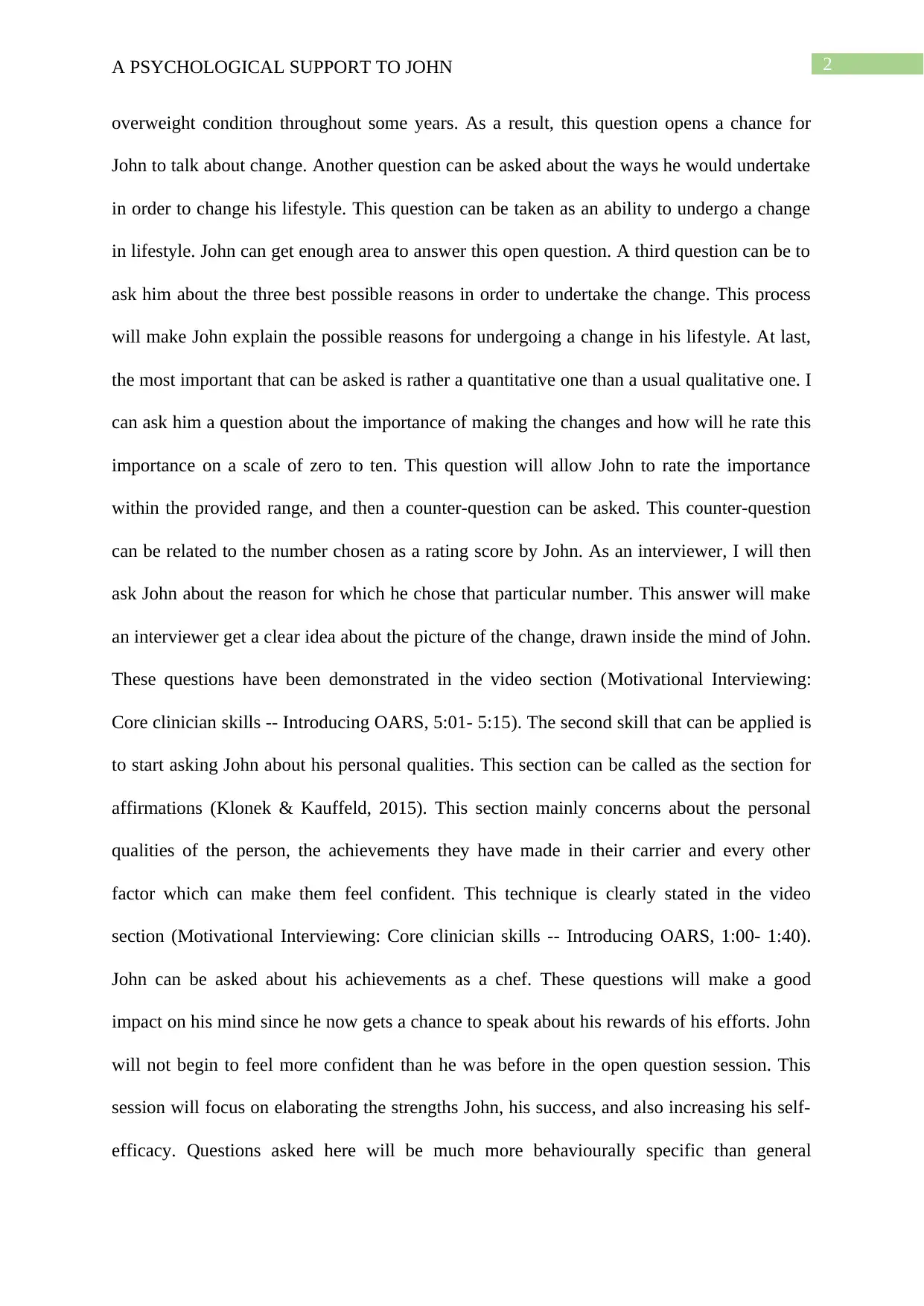
2A PSYCHOLOGICAL SUPPORT TO JOHN
overweight condition throughout some years. As a result, this question opens a chance for
John to talk about change. Another question can be asked about the ways he would undertake
in order to change his lifestyle. This question can be taken as an ability to undergo a change
in lifestyle. John can get enough area to answer this open question. A third question can be to
ask him about the three best possible reasons in order to undertake the change. This process
will make John explain the possible reasons for undergoing a change in his lifestyle. At last,
the most important that can be asked is rather a quantitative one than a usual qualitative one. I
can ask him a question about the importance of making the changes and how will he rate this
importance on a scale of zero to ten. This question will allow John to rate the importance
within the provided range, and then a counter-question can be asked. This counter-question
can be related to the number chosen as a rating score by John. As an interviewer, I will then
ask John about the reason for which he chose that particular number. This answer will make
an interviewer get a clear idea about the picture of the change, drawn inside the mind of John.
These questions have been demonstrated in the video section (Motivational Interviewing:
Core clinician skills -- Introducing OARS, 5:01- 5:15). The second skill that can be applied is
to start asking John about his personal qualities. This section can be called as the section for
affirmations (Klonek & Kauffeld, 2015). This section mainly concerns about the personal
qualities of the person, the achievements they have made in their carrier and every other
factor which can make them feel confident. This technique is clearly stated in the video
section (Motivational Interviewing: Core clinician skills -- Introducing OARS, 1:00- 1:40).
John can be asked about his achievements as a chef. These questions will make a good
impact on his mind since he now gets a chance to speak about his rewards of his efforts. John
will not begin to feel more confident than he was before in the open question session. This
session will focus on elaborating the strengths John, his success, and also increasing his self-
efficacy. Questions asked here will be much more behaviourally specific than general
overweight condition throughout some years. As a result, this question opens a chance for
John to talk about change. Another question can be asked about the ways he would undertake
in order to change his lifestyle. This question can be taken as an ability to undergo a change
in lifestyle. John can get enough area to answer this open question. A third question can be to
ask him about the three best possible reasons in order to undertake the change. This process
will make John explain the possible reasons for undergoing a change in his lifestyle. At last,
the most important that can be asked is rather a quantitative one than a usual qualitative one. I
can ask him a question about the importance of making the changes and how will he rate this
importance on a scale of zero to ten. This question will allow John to rate the importance
within the provided range, and then a counter-question can be asked. This counter-question
can be related to the number chosen as a rating score by John. As an interviewer, I will then
ask John about the reason for which he chose that particular number. This answer will make
an interviewer get a clear idea about the picture of the change, drawn inside the mind of John.
These questions have been demonstrated in the video section (Motivational Interviewing:
Core clinician skills -- Introducing OARS, 5:01- 5:15). The second skill that can be applied is
to start asking John about his personal qualities. This section can be called as the section for
affirmations (Klonek & Kauffeld, 2015). This section mainly concerns about the personal
qualities of the person, the achievements they have made in their carrier and every other
factor which can make them feel confident. This technique is clearly stated in the video
section (Motivational Interviewing: Core clinician skills -- Introducing OARS, 1:00- 1:40).
John can be asked about his achievements as a chef. These questions will make a good
impact on his mind since he now gets a chance to speak about his rewards of his efforts. John
will not begin to feel more confident than he was before in the open question session. This
session will focus on elaborating the strengths John, his success, and also increasing his self-
efficacy. Questions asked here will be much more behaviourally specific than general
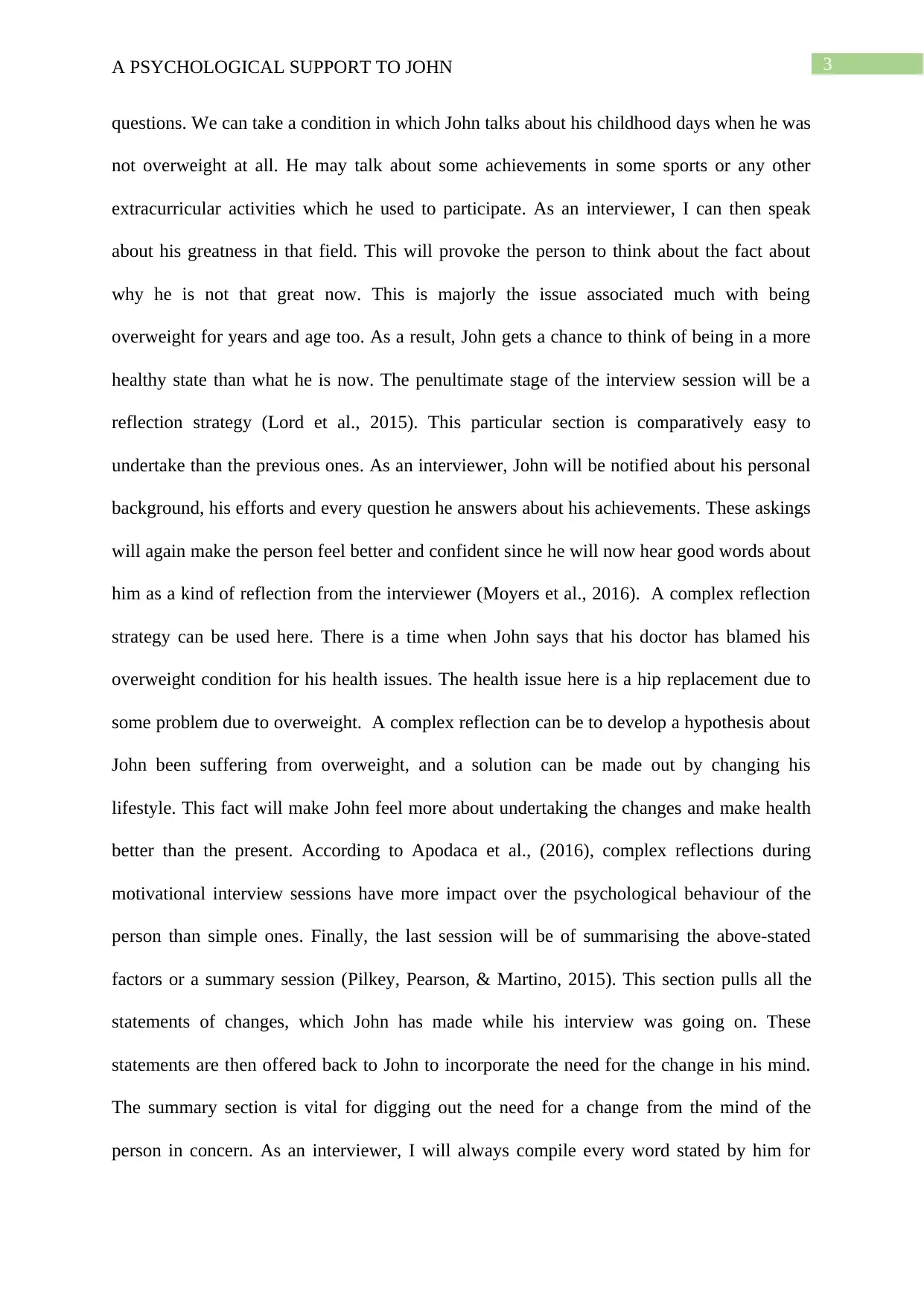
3A PSYCHOLOGICAL SUPPORT TO JOHN
questions. We can take a condition in which John talks about his childhood days when he was
not overweight at all. He may talk about some achievements in some sports or any other
extracurricular activities which he used to participate. As an interviewer, I can then speak
about his greatness in that field. This will provoke the person to think about the fact about
why he is not that great now. This is majorly the issue associated much with being
overweight for years and age too. As a result, John gets a chance to think of being in a more
healthy state than what he is now. The penultimate stage of the interview session will be a
reflection strategy (Lord et al., 2015). This particular section is comparatively easy to
undertake than the previous ones. As an interviewer, John will be notified about his personal
background, his efforts and every question he answers about his achievements. These askings
will again make the person feel better and confident since he will now hear good words about
him as a kind of reflection from the interviewer (Moyers et al., 2016). A complex reflection
strategy can be used here. There is a time when John says that his doctor has blamed his
overweight condition for his health issues. The health issue here is a hip replacement due to
some problem due to overweight. A complex reflection can be to develop a hypothesis about
John been suffering from overweight, and a solution can be made out by changing his
lifestyle. This fact will make John feel more about undertaking the changes and make health
better than the present. According to Apodaca et al., (2016), complex reflections during
motivational interview sessions have more impact over the psychological behaviour of the
person than simple ones. Finally, the last session will be of summarising the above-stated
factors or a summary session (Pilkey, Pearson, & Martino, 2015). This section pulls all the
statements of changes, which John has made while his interview was going on. These
statements are then offered back to John to incorporate the need for the change in his mind.
The summary section is vital for digging out the need for a change from the mind of the
person in concern. As an interviewer, I will always compile every word stated by him for
questions. We can take a condition in which John talks about his childhood days when he was
not overweight at all. He may talk about some achievements in some sports or any other
extracurricular activities which he used to participate. As an interviewer, I can then speak
about his greatness in that field. This will provoke the person to think about the fact about
why he is not that great now. This is majorly the issue associated much with being
overweight for years and age too. As a result, John gets a chance to think of being in a more
healthy state than what he is now. The penultimate stage of the interview session will be a
reflection strategy (Lord et al., 2015). This particular section is comparatively easy to
undertake than the previous ones. As an interviewer, John will be notified about his personal
background, his efforts and every question he answers about his achievements. These askings
will again make the person feel better and confident since he will now hear good words about
him as a kind of reflection from the interviewer (Moyers et al., 2016). A complex reflection
strategy can be used here. There is a time when John says that his doctor has blamed his
overweight condition for his health issues. The health issue here is a hip replacement due to
some problem due to overweight. A complex reflection can be to develop a hypothesis about
John been suffering from overweight, and a solution can be made out by changing his
lifestyle. This fact will make John feel more about undertaking the changes and make health
better than the present. According to Apodaca et al., (2016), complex reflections during
motivational interview sessions have more impact over the psychological behaviour of the
person than simple ones. Finally, the last session will be of summarising the above-stated
factors or a summary session (Pilkey, Pearson, & Martino, 2015). This section pulls all the
statements of changes, which John has made while his interview was going on. These
statements are then offered back to John to incorporate the need for the change in his mind.
The summary section is vital for digging out the need for a change from the mind of the
person in concern. As an interviewer, I will always compile every word stated by him for
Secure Best Marks with AI Grader
Need help grading? Try our AI Grader for instant feedback on your assignments.
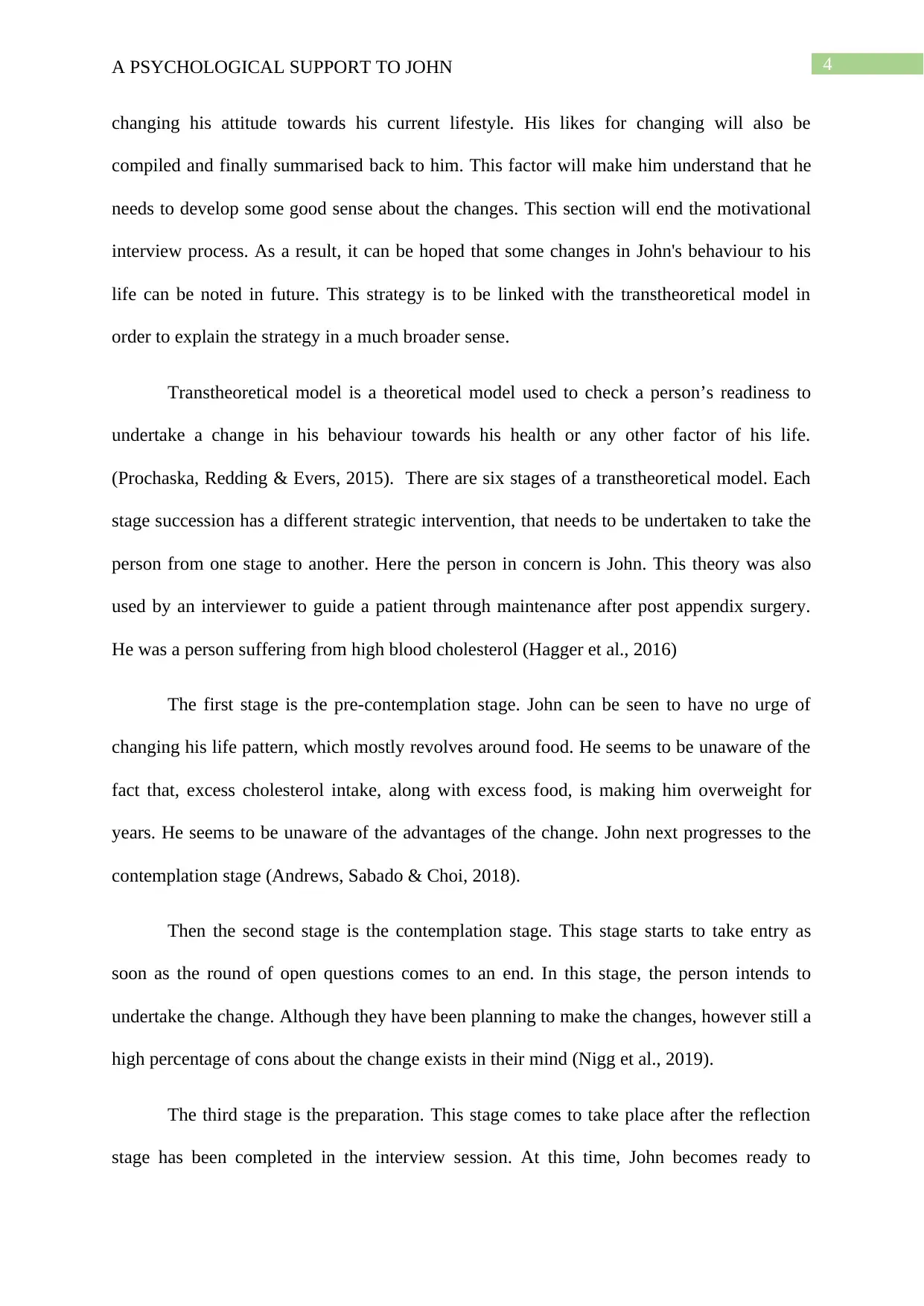
4A PSYCHOLOGICAL SUPPORT TO JOHN
changing his attitude towards his current lifestyle. His likes for changing will also be
compiled and finally summarised back to him. This factor will make him understand that he
needs to develop some good sense about the changes. This section will end the motivational
interview process. As a result, it can be hoped that some changes in John's behaviour to his
life can be noted in future. This strategy is to be linked with the transtheoretical model in
order to explain the strategy in a much broader sense.
Transtheoretical model is a theoretical model used to check a person’s readiness to
undertake a change in his behaviour towards his health or any other factor of his life.
(Prochaska, Redding & Evers, 2015). There are six stages of a transtheoretical model. Each
stage succession has a different strategic intervention, that needs to be undertaken to take the
person from one stage to another. Here the person in concern is John. This theory was also
used by an interviewer to guide a patient through maintenance after post appendix surgery.
He was a person suffering from high blood cholesterol (Hagger et al., 2016)
The first stage is the pre-contemplation stage. John can be seen to have no urge of
changing his life pattern, which mostly revolves around food. He seems to be unaware of the
fact that, excess cholesterol intake, along with excess food, is making him overweight for
years. He seems to be unaware of the advantages of the change. John next progresses to the
contemplation stage (Andrews, Sabado & Choi, 2018).
Then the second stage is the contemplation stage. This stage starts to take entry as
soon as the round of open questions comes to an end. In this stage, the person intends to
undertake the change. Although they have been planning to make the changes, however still a
high percentage of cons about the change exists in their mind (Nigg et al., 2019).
The third stage is the preparation. This stage comes to take place after the reflection
stage has been completed in the interview session. At this time, John becomes ready to
changing his attitude towards his current lifestyle. His likes for changing will also be
compiled and finally summarised back to him. This factor will make him understand that he
needs to develop some good sense about the changes. This section will end the motivational
interview process. As a result, it can be hoped that some changes in John's behaviour to his
life can be noted in future. This strategy is to be linked with the transtheoretical model in
order to explain the strategy in a much broader sense.
Transtheoretical model is a theoretical model used to check a person’s readiness to
undertake a change in his behaviour towards his health or any other factor of his life.
(Prochaska, Redding & Evers, 2015). There are six stages of a transtheoretical model. Each
stage succession has a different strategic intervention, that needs to be undertaken to take the
person from one stage to another. Here the person in concern is John. This theory was also
used by an interviewer to guide a patient through maintenance after post appendix surgery.
He was a person suffering from high blood cholesterol (Hagger et al., 2016)
The first stage is the pre-contemplation stage. John can be seen to have no urge of
changing his life pattern, which mostly revolves around food. He seems to be unaware of the
fact that, excess cholesterol intake, along with excess food, is making him overweight for
years. He seems to be unaware of the advantages of the change. John next progresses to the
contemplation stage (Andrews, Sabado & Choi, 2018).
Then the second stage is the contemplation stage. This stage starts to take entry as
soon as the round of open questions comes to an end. In this stage, the person intends to
undertake the change. Although they have been planning to make the changes, however still a
high percentage of cons about the change exists in their mind (Nigg et al., 2019).
The third stage is the preparation. This stage comes to take place after the reflection
stage has been completed in the interview session. At this time, John becomes ready to
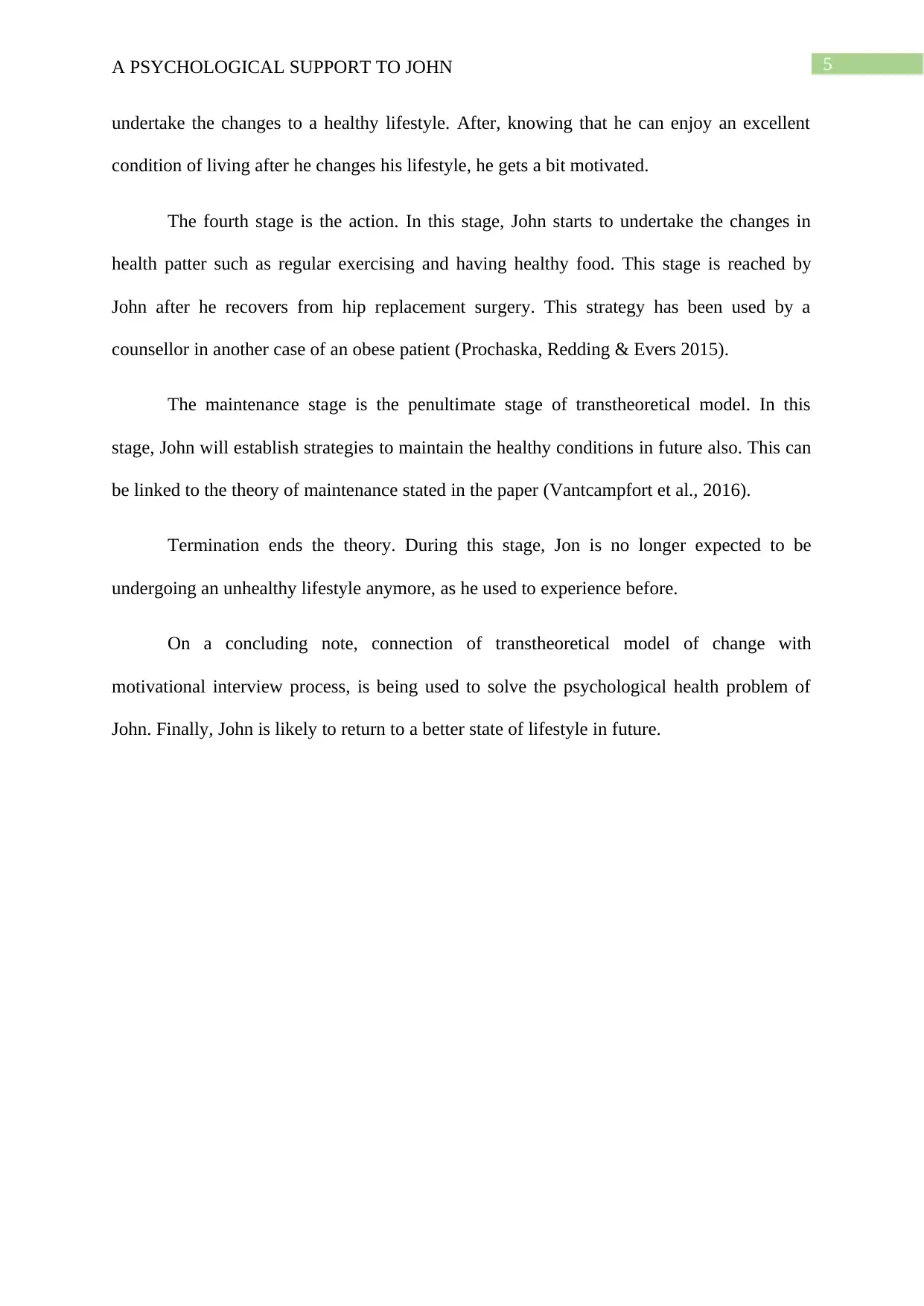
5A PSYCHOLOGICAL SUPPORT TO JOHN
undertake the changes to a healthy lifestyle. After, knowing that he can enjoy an excellent
condition of living after he changes his lifestyle, he gets a bit motivated.
The fourth stage is the action. In this stage, John starts to undertake the changes in
health patter such as regular exercising and having healthy food. This stage is reached by
John after he recovers from hip replacement surgery. This strategy has been used by a
counsellor in another case of an obese patient (Prochaska, Redding & Evers 2015).
The maintenance stage is the penultimate stage of transtheoretical model. In this
stage, John will establish strategies to maintain the healthy conditions in future also. This can
be linked to the theory of maintenance stated in the paper (Vantcampfort et al., 2016).
Termination ends the theory. During this stage, Jon is no longer expected to be
undergoing an unhealthy lifestyle anymore, as he used to experience before.
On a concluding note, connection of transtheoretical model of change with
motivational interview process, is being used to solve the psychological health problem of
John. Finally, John is likely to return to a better state of lifestyle in future.
undertake the changes to a healthy lifestyle. After, knowing that he can enjoy an excellent
condition of living after he changes his lifestyle, he gets a bit motivated.
The fourth stage is the action. In this stage, John starts to undertake the changes in
health patter such as regular exercising and having healthy food. This stage is reached by
John after he recovers from hip replacement surgery. This strategy has been used by a
counsellor in another case of an obese patient (Prochaska, Redding & Evers 2015).
The maintenance stage is the penultimate stage of transtheoretical model. In this
stage, John will establish strategies to maintain the healthy conditions in future also. This can
be linked to the theory of maintenance stated in the paper (Vantcampfort et al., 2016).
Termination ends the theory. During this stage, Jon is no longer expected to be
undergoing an unhealthy lifestyle anymore, as he used to experience before.
On a concluding note, connection of transtheoretical model of change with
motivational interview process, is being used to solve the psychological health problem of
John. Finally, John is likely to return to a better state of lifestyle in future.
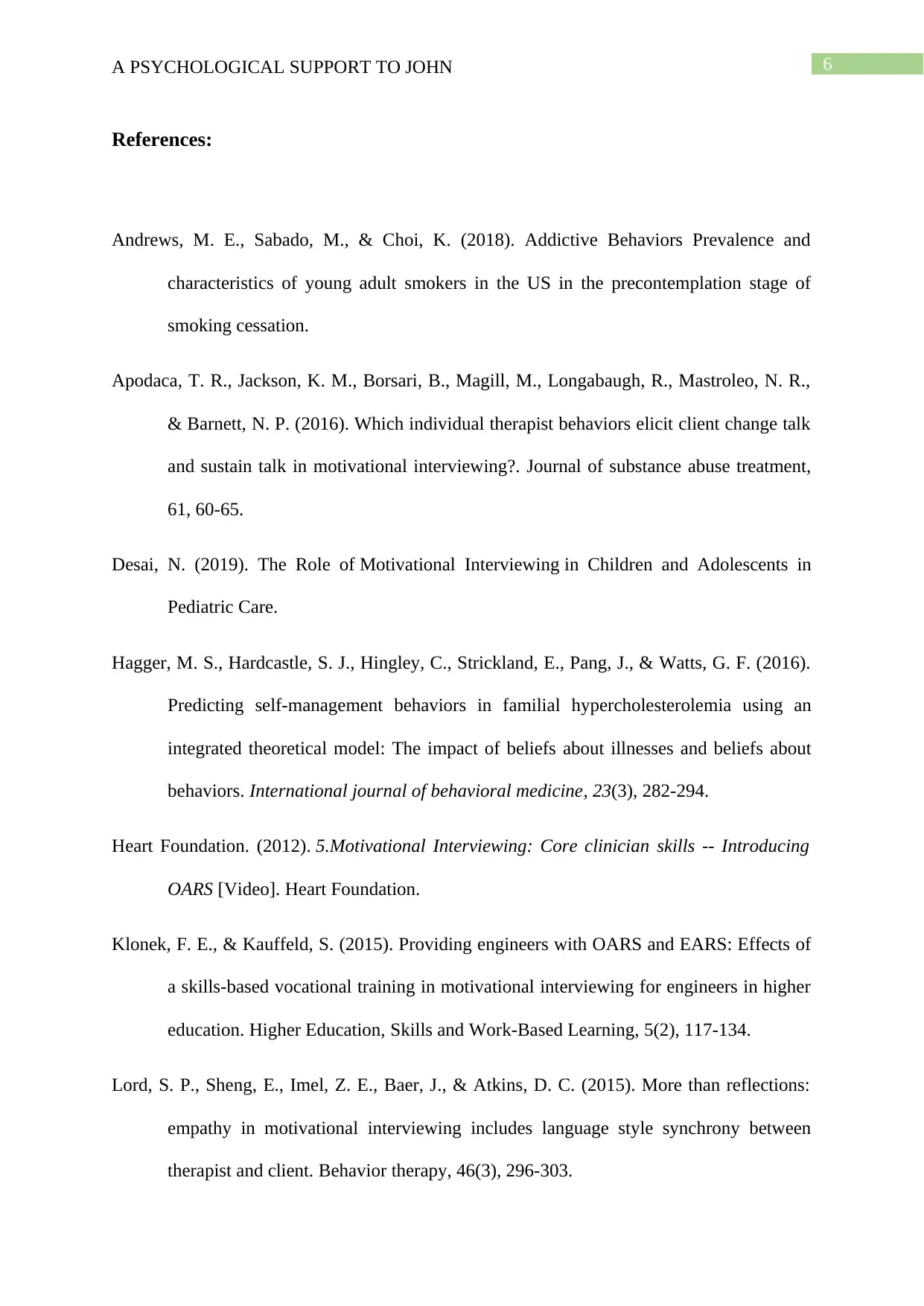
6A PSYCHOLOGICAL SUPPORT TO JOHN
References:
Andrews, M. E., Sabado, M., & Choi, K. (2018). Addictive Behaviors Prevalence and
characteristics of young adult smokers in the US in the precontemplation stage of
smoking cessation.
Apodaca, T. R., Jackson, K. M., Borsari, B., Magill, M., Longabaugh, R., Mastroleo, N. R.,
& Barnett, N. P. (2016). Which individual therapist behaviors elicit client change talk
and sustain talk in motivational interviewing?. Journal of substance abuse treatment,
61, 60-65.
Desai, N. (2019). The Role of Motivational Interviewing in Children and Adolescents in
Pediatric Care.
Hagger, M. S., Hardcastle, S. J., Hingley, C., Strickland, E., Pang, J., & Watts, G. F. (2016).
Predicting self-management behaviors in familial hypercholesterolemia using an
integrated theoretical model: The impact of beliefs about illnesses and beliefs about
behaviors. International journal of behavioral medicine, 23(3), 282-294.
Heart Foundation. (2012). 5.Motivational Interviewing: Core clinician skills -- Introducing
OARS [Video]. Heart Foundation.
Klonek, F. E., & Kauffeld, S. (2015). Providing engineers with OARS and EARS: Effects of
a skills-based vocational training in motivational interviewing for engineers in higher
education. Higher Education, Skills and Work-Based Learning, 5(2), 117-134.
Lord, S. P., Sheng, E., Imel, Z. E., Baer, J., & Atkins, D. C. (2015). More than reflections:
empathy in motivational interviewing includes language style synchrony between
therapist and client. Behavior therapy, 46(3), 296-303.
References:
Andrews, M. E., Sabado, M., & Choi, K. (2018). Addictive Behaviors Prevalence and
characteristics of young adult smokers in the US in the precontemplation stage of
smoking cessation.
Apodaca, T. R., Jackson, K. M., Borsari, B., Magill, M., Longabaugh, R., Mastroleo, N. R.,
& Barnett, N. P. (2016). Which individual therapist behaviors elicit client change talk
and sustain talk in motivational interviewing?. Journal of substance abuse treatment,
61, 60-65.
Desai, N. (2019). The Role of Motivational Interviewing in Children and Adolescents in
Pediatric Care.
Hagger, M. S., Hardcastle, S. J., Hingley, C., Strickland, E., Pang, J., & Watts, G. F. (2016).
Predicting self-management behaviors in familial hypercholesterolemia using an
integrated theoretical model: The impact of beliefs about illnesses and beliefs about
behaviors. International journal of behavioral medicine, 23(3), 282-294.
Heart Foundation. (2012). 5.Motivational Interviewing: Core clinician skills -- Introducing
OARS [Video]. Heart Foundation.
Klonek, F. E., & Kauffeld, S. (2015). Providing engineers with OARS and EARS: Effects of
a skills-based vocational training in motivational interviewing for engineers in higher
education. Higher Education, Skills and Work-Based Learning, 5(2), 117-134.
Lord, S. P., Sheng, E., Imel, Z. E., Baer, J., & Atkins, D. C. (2015). More than reflections:
empathy in motivational interviewing includes language style synchrony between
therapist and client. Behavior therapy, 46(3), 296-303.
Paraphrase This Document
Need a fresh take? Get an instant paraphrase of this document with our AI Paraphraser
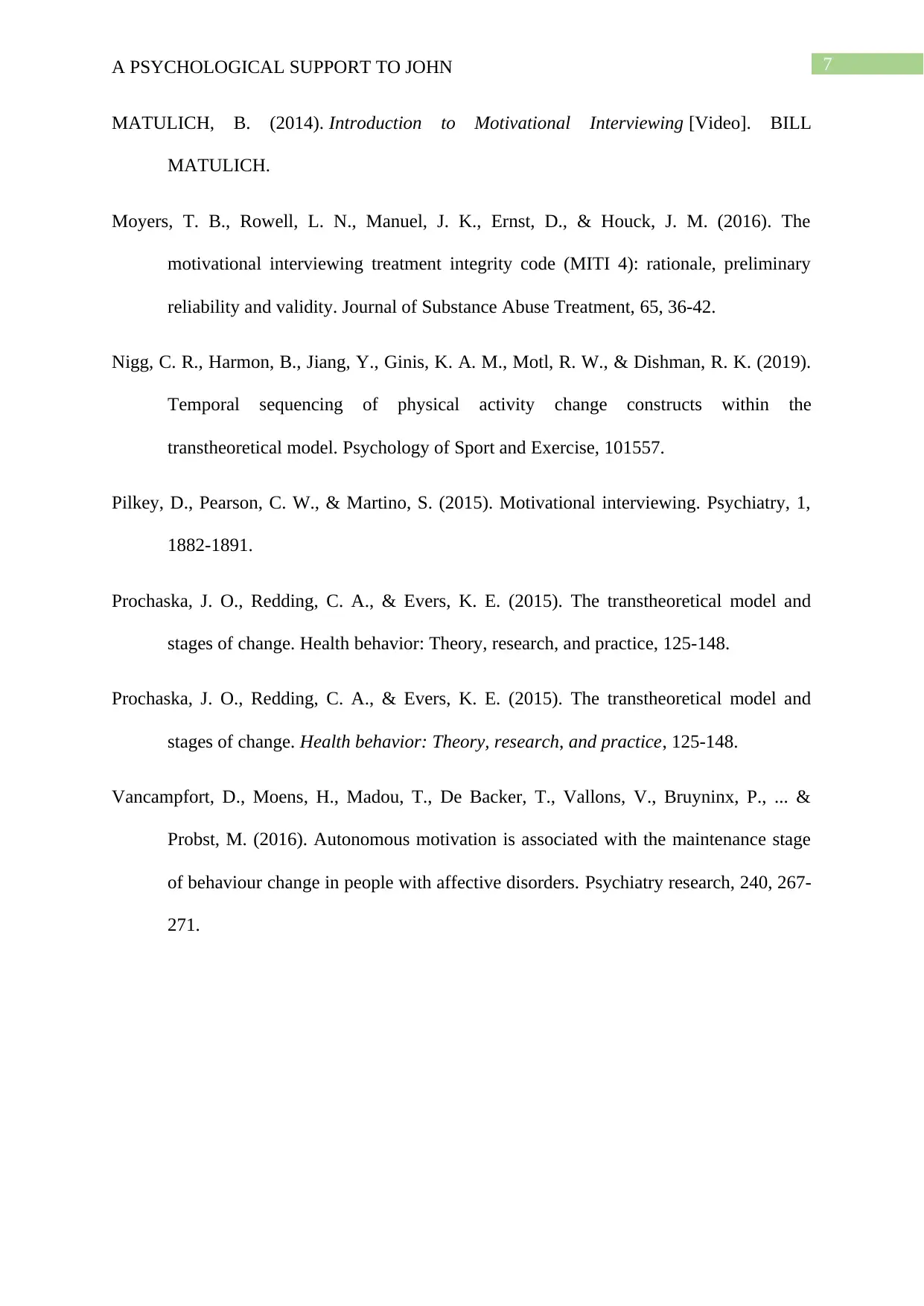
7A PSYCHOLOGICAL SUPPORT TO JOHN
MATULICH, B. (2014). Introduction to Motivational Interviewing [Video]. BILL
MATULICH.
Moyers, T. B., Rowell, L. N., Manuel, J. K., Ernst, D., & Houck, J. M. (2016). The
motivational interviewing treatment integrity code (MITI 4): rationale, preliminary
reliability and validity. Journal of Substance Abuse Treatment, 65, 36-42.
Nigg, C. R., Harmon, B., Jiang, Y., Ginis, K. A. M., Motl, R. W., & Dishman, R. K. (2019).
Temporal sequencing of physical activity change constructs within the
transtheoretical model. Psychology of Sport and Exercise, 101557.
Pilkey, D., Pearson, C. W., & Martino, S. (2015). Motivational interviewing. Psychiatry, 1,
1882-1891.
Prochaska, J. O., Redding, C. A., & Evers, K. E. (2015). The transtheoretical model and
stages of change. Health behavior: Theory, research, and practice, 125-148.
Prochaska, J. O., Redding, C. A., & Evers, K. E. (2015). The transtheoretical model and
stages of change. Health behavior: Theory, research, and practice, 125-148.
Vancampfort, D., Moens, H., Madou, T., De Backer, T., Vallons, V., Bruyninx, P., ... &
Probst, M. (2016). Autonomous motivation is associated with the maintenance stage
of behaviour change in people with affective disorders. Psychiatry research, 240, 267-
271.
MATULICH, B. (2014). Introduction to Motivational Interviewing [Video]. BILL
MATULICH.
Moyers, T. B., Rowell, L. N., Manuel, J. K., Ernst, D., & Houck, J. M. (2016). The
motivational interviewing treatment integrity code (MITI 4): rationale, preliminary
reliability and validity. Journal of Substance Abuse Treatment, 65, 36-42.
Nigg, C. R., Harmon, B., Jiang, Y., Ginis, K. A. M., Motl, R. W., & Dishman, R. K. (2019).
Temporal sequencing of physical activity change constructs within the
transtheoretical model. Psychology of Sport and Exercise, 101557.
Pilkey, D., Pearson, C. W., & Martino, S. (2015). Motivational interviewing. Psychiatry, 1,
1882-1891.
Prochaska, J. O., Redding, C. A., & Evers, K. E. (2015). The transtheoretical model and
stages of change. Health behavior: Theory, research, and practice, 125-148.
Prochaska, J. O., Redding, C. A., & Evers, K. E. (2015). The transtheoretical model and
stages of change. Health behavior: Theory, research, and practice, 125-148.
Vancampfort, D., Moens, H., Madou, T., De Backer, T., Vallons, V., Bruyninx, P., ... &
Probst, M. (2016). Autonomous motivation is associated with the maintenance stage
of behaviour change in people with affective disorders. Psychiatry research, 240, 267-
271.
1 out of 8
Your All-in-One AI-Powered Toolkit for Academic Success.
+13062052269
info@desklib.com
Available 24*7 on WhatsApp / Email
![[object Object]](/_next/static/media/star-bottom.7253800d.svg)
Unlock your academic potential
© 2024 | Zucol Services PVT LTD | All rights reserved.